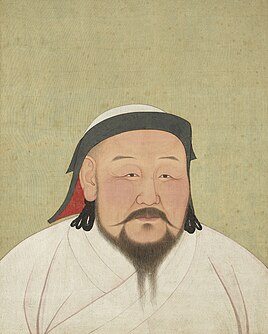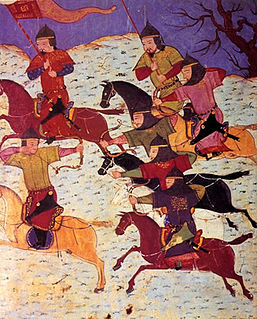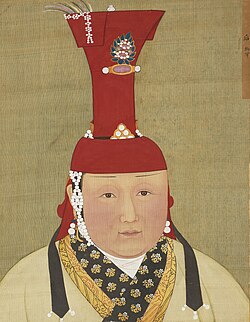 W
WAriq Böke, the components of his name also spelled Arigh, Arik and Bukha, Buka, was the seventh and youngest son of Tolui and a grandson of Genghis Khan. After the death of his brother the Great Khan Möngke, Ariq Böke claimed the title of the Great Khan of the Mongol Empire and briefly took power while his brothers Kublai and Hulagu were absent from the Mongolian homeland. When Kublai returned for an election in 1260, rival factions could not agree, and elected both claimants, Kublai and Ariq Böke, to the throne, resulting in the Toluid Civil War that fragmented the Mongol Empire. Ariq Böke was supported by the traditionalists of the Mongol Empire, while his brother Kublai was supported by the senior princes of North China and Manchuria.
 W
WGenghis Khan, also officially Genghis Huangdi, was the founder and first Great Khan and Emperor of the Mongol Empire, which became the largest contiguous empire in history after his death. He came to power by uniting many of the nomadic tribes of Northeast Asia. After founding the Empire and being proclaimed Genghis Khan, he launched the Mongol invasions that conquered most of Eurasia, reaching as far west as Poland and the Levant in the Middle East. Campaigns initiated in his lifetime include those against the Qara Khitai, Khwarezmia, and the Western Xia and Jin dynasties, and raids into Medieval Georgia, the Kievan Rus', and Volga Bulgaria. These campaigns were often accompanied by large-scale massacres of the civilian populations, especially in the Khwarazmian- and Western Xia–controlled lands. Because of this brutality, which left millions dead, he is considered by many to have been a brutal ruler. By the end of his life, the Mongol Empire occupied a substantial portion of Central Asia and China. Due to his exceptional military successes, Genghis Khan is often considered to be the greatest conqueror of all time.
 W
WGüyük was the third Great Khan of the Mongol Empire, the eldest son of Ögedei Khan and a grandson of Genghis Khan. He reigned from 1246 to 1248.
 W
WKaidu was the grandson of Mongol Khagan Ogedei Khan (1185–1241) and thus leader of the House of Ögedei and the de facto khan of the Chagatai Khanate, a division of the Mongol Empire. He ruled part of modern-day Xinjiang and Central Asia during the 13th century, and actively opposed his cousin, Kublai Khan, who established the Yuan dynasty in China, until Kaidu's death in 1301. Medieval chroniclers often mistranslated Kadan as Kaidu, mistakenly placing Kaidu at the Battle of Legnica. Kadan was the brother of Güyük, and Kaidu's uncle.
 W
WKublai, also known as the Emperor Shizu of Yuan, was the fifth khagan of the Mongol Empire, reigning from 1260 to 1294. He also founded the Yuan dynasty in China as a conquest dynasty in 1271, and ruled as the first Yuan emperor until his death in 1294.
 W
WOrda Ichen, was a Mongol Khan and military strategist who ruled the eastern part of the Golden Horde during the 13th century.
 W
WMöngke was the fourth khagan of the Mongol Empire, ruling from 1 July 1251, to 11 August 1259. He was the first Khagan from the Toluid line, and made significant reforms to improve the administration of the Empire during his reign. Under Möngke, the Mongols conquered Iraq and Syria as well as the kingdom of Dali.
 W
WEmpress Nambui was a Khongirad empress consort of the Yuan dynasty. She was married to Kublai Khan after the death of his first wife Chabi.
 W
WÖgedei was the third son of Genghis Khan and second Great Khan of the Mongol Empire, succeeding his father. He continued the expansion of the empire that his father had begun, and was a world figure when the Mongol Empire reached its farthest extent west and south during the Mongol invasions of Europe and East Asia. Like all of Genghis' primary sons, he participated extensively in conquests in China, Iran, and Central Asia.
 W
WTayang khan — was a khan of the Naimans. According to The Secret History of the Mongols, his was physically weak when he was born and his father Inanch Bilge did not believe his son would survive to adulthood, therefore he was also called Torluq Tayang.
 W
WTemür Öljeytü Khan, born Temür, also known by the temple name Chengzong was the second emperor of the Yuan dynasty, ruling from May 10, 1294 to February 10, 1307. Apart from Emperor of China, he is considered as the sixth Great Khan of the Mongol Empire or Mongols, although it was only nominal due to the division of the empire. He was an able ruler of the Yuan, and his reign established the patterns of power for the next few decades. His name means "blessed iron Khan" in the Mongolian language.